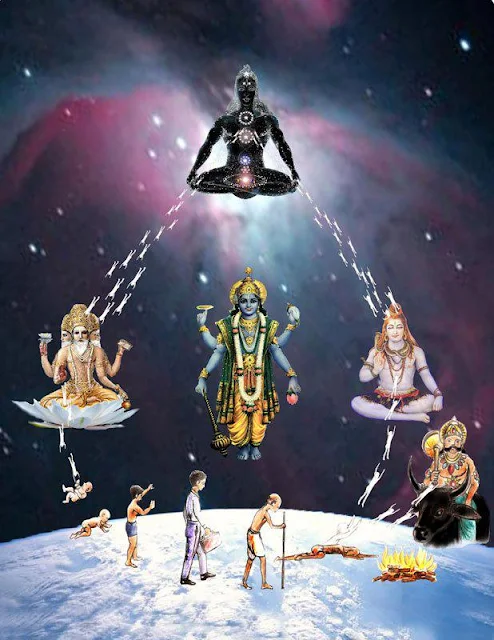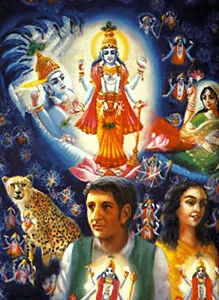2) Param-atma - the Supersoul, known as the Supreme Lord, who resides in the hearts of all living entities as the witness.
Both the Supreme Lord and the living entity are known as atma. The Supreme Lord is called Paramatma, and the living entity is called the atma, the brahma or the the jiva.
Both the Paramatma and the jivatma, being transcendental to the material energy, are called atma. Generally people have many wrong conceptions about both of them. The wrong conception of the jivatma is to identify the material body with the pure soul, and the wrong conception of Paramatma is to think Him on an equal level with the living entity.
In the Upanisads it is explained that there are two types of souls which are technically known as jiva-atma and param-atma. Jiva-atma, or the individual soul, is the living entity and param-atma refers to the Supreme Lord who expands Himself as the Supersoul, who enters into the hearts of all living entities as well as all atoms.
This is also confirmed in Bhagavad-gita [13.23] where it is stated that besides the living entity, who tries to enjoy in his physical body, there is another, a transcendental enjoyer who is the Lord, the supreme proprietor, who exists as the overseer and guide, and who is known as the Supersoul. He is not an ordinary living entity, but the plenary expansion of the Supreme Lord. Because monist philosophers and impersonalists take the soul and supersoul to be one, they think that there is no difference between the Supersoul and the individual soul. To clarify this the Lord says that He is the representation of Param-atma in every body. He is different from the individual soul; He is parah, transcendental.
The individual soul, deluded by material energy, tries to enjoy the activities of particular types of bodies offered by material nature, but the Supersoul is present not as finite enjoyer nor as one taking part in bodily activities, but as the witness and permission giver. He is present within to sanction the individual soul's desires for material enjoyment.
The Supersoul fulfils the desire of the atomic soul as one friend fulfils the desire of another. The Upanisads compare the soul and Supersoul to two friendly birds sitting within the same tree. One of the birds (the individual atomic soul) is eating the fruit of the tree, and the other bird (the Supersoul) is simply watching His friend. Of these two birds - although they are similar in their characteristic natures - one is captivated by the fruits of the material tree, while the other, who is self satisfied, is simply witnessing the activities of His friend.
The Supreme Lord, who enters the hearts of all living entities in the form of the Supersoul, is compared to the witnessing bird. The other bird, the fruit-eater (living entity), who is enchanted by the fruits of material enjoyment, has forgotten his relationship with his friend. Forgetfulness of this relationship by the atomic soul is the cause of one's changing his position from one tree to another or from one body to another. Thus the jiva soul is struggling very hard within the tree of the material body, but as soon as he turns his attention to his friend, the Supersoul, the subordinate bird immediately becomes free from all lamentation.
The Katha-Upanisad states that although the two birds are in the same tree, the eating bird, which has to face the reactions of his activities, is fully engrossed with anxiety and moroseness as the enjoyer of the fruits of the tree, while the other bird, who is the witnessing Lord, maintains His transcendental position without being affected by the material atmosphere. If somehow the individual soul turns his face to his friend the Supersoul, the suffering living entity becomes free from all anxieties.
The fact is that individual living entities are eternally part and parcel of the Supreme Lord, and both of them are very intimately related as friends. But the living entity has the tendency to reject the sanction of the Supreme Lord and act independently in an attempt to dominate the supreme nature, and because he has this tendency, he is called the marginal energy of the Supreme Lord. The living entity can be situated either in the material energy or the spiritual energy. As long as he is conditioned by the material energy, the Supreme Lord, as his friend, the Supersoul, stays with him just to get him to return to the spiritual energy. The Lord is always eager to take him back to the spiritual energy, but due to his minute independence, the individual entity is continually rejecting the association of spiritual atmosphere.
 This misuse of independence is the cause of his material strife in the conditioned nature. The Lord, Vedic scriptures as the Bhagavad-gita, and from within He acts as the Supersoul to enlighten the conditioned soul about his spiritual nature. Thus the intelligent person, who understands the difference between the Soul and Supersoul, can advance toward a blissful eternal life of knowledge.
This misuse of independence is the cause of his material strife in the conditioned nature. The Lord, Vedic scriptures as the Bhagavad-gita, and from within He acts as the Supersoul to enlighten the conditioned soul about his spiritual nature. Thus the intelligent person, who understands the difference between the Soul and Supersoul, can advance toward a blissful eternal life of knowledge.therefore, is giving advice and instruction from within and from without. From without He gives instructions through such
Clear understanding of material nature, the Supersoul, the individual soul and their interrelation makes one eligible to become liberated and turn to the spiritual atmosphere without being forced to return to this material nature. This is the result of knowledge. The purpose of knowledge is to understand distinctly that the living entity has by chance fallen into this material existence. By his personal endeavor in association with authorities, saintly persons and a spiritual master, he has to understand his position and then revert to spiritual consciousness or Krishna consciousness by understanding Bhagavad-gita as it is explained by the Personality of Godhead. Then it is certain that he will never come again into this material existence; he will be transferred into the spiritual world for a blissful eternal life of knowledge.






![2 Types of Souls [atma] - Jiva-atma Param-atma](https://blogger.googleusercontent.com/img/b/R29vZ2xl/AVvXsEhpKjylNI6VOA3JCMZ1NcW6NNTTYT2rLSD99-psgvMdwXu4ubcb0bEUc_kxvIMa_TkvXPgfVOfD0Ay_KJ3lfmp-h-bPBBqht6flUllhfOtZXX4ahCrPrxH9LpYHkCYQMQY9vEetwv-NQHw/w74-h74-p-k-no-nu/atma+44.jpg)



Beautiful.Absolute true.
ReplyDelete